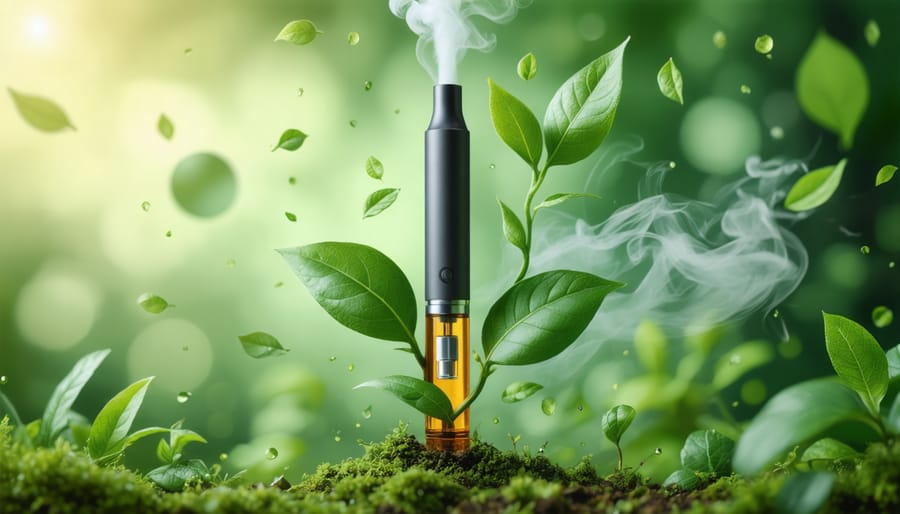To reduce the ecological impact of CBD hemp cultivation, prioritize organic farming practices and delta 9 edibles that align with green values. Implement eco-friendly extraction methods, such as CO2 extraction, to minimize solvent use and waste. Source plant-derived ingredients and biodegradable packaging to decrease your carbon footprint. Collaborate with renewable energy providers to power production facilities sustainably. Champion transparency and educate consumers on environmentally responsible choices. Engage with industry leaders and policymakers to advocate for stringent regulations that support sustainable production standards.
Understanding the Environmental Impact of CBD Gummy Production
Resource Consumption in CBD Production
In the sustainable production of CBD gummies, resource consumption is a critical factor. Water, energy, and raw materials play pivotal roles, and their usage can significantly impact the environment. Cultivating hemp, the primary raw material, demands substantial water resources, yet sustainable practices like rainwater harvesting and drip irrigation can drastically reduce this need. Energy usage is another focal point, particularly during the extraction of CBD oil from hemp. Utilizing renewable energy sources such as wind or solar power can help minimize the carbon footprint associated with traditional energy consumption. Transitioning to energy-efficient technologies during production further reduces environmental impact.
Moreover, sourcing organic ingredients and biodegradable packaging materials not only supports biodiversity but also lessens the reliance on chemical fertilizers and plastic waste. As we advance, adopting sustainable innovations in each stage of production is essential for reducing the ecological footprint of CBD gummies. Empowering consumers through transparency about these practices encourages informed purchasing decisions and drives the demand for greener solutions. By aligning with sustainable production methods, CBD gummy manufacturers can lead the way in creating a more environmentally conscious industry.
Waste and Pollution Concerns
The sustainable production of CBD gummies raises significant concerns about waste and pollution. In conventional manufacturing processes, large quantities of non-biodegradable waste are generated, primarily from packaging and unused raw materials. This accumulation contributes to severe environmental challenges, with plastics and other pollutants entering ecosystems and waterways, wreaking havoc on aquatic life. To fully grasp these implications, it’s essential to acknowledge the broader water pollution concerns impacting our environment.
To mitigate these effects, it’s crucial to adopt sustainable practices. Innovative solutions, such as utilizing biodegradable materials for packaging and optimizing supply chains, can significantly reduce environmental footprints. By incorporating waste-reducing technologies and embracing a circular economic model, manufacturers can protect natural resources and ensure the long-term viability of their products.
Empowering consumers to demand accountability from companies and to support eco-friendly brands is a vital step forward. Together, through informed choices and strong advocacy, we can decrease waste and safeguard our planet’s ecosystems while enjoying the benefits of CBD in a more sustainable manner. This journey toward sustainability in CBD gummy production is a shared responsibility and holds the promise of a cleaner, healthier future.

Innovative Approaches to Sustainable Production

Eco-Friendly Ingredients Sourcing
Sourcing ingredients sustainably is crucial in minimizing the environmental footprint of CBD gummies. This begins with selecting components that are cultivated through organic farming methods, which eliminate the use of harmful synthetic pesticides and fertilizers. Organic farming not only protects the health of the soil but also supports biodiversity by fostering ecosystems that accommodate various species. By prioritizing organic ingredients, the CBD gummy industry can significantly reduce water pollution and soil degradation, vital steps toward preserving our planet’s natural resources.
Moreover, choosing local and seasonal organic sources can further decrease carbon emissions linked with transportation, reinforcing a more sustainable production model. This approach empowers consumers to support practices that align with their environmental values and advocate for systemic change within the industry. By prioritizing eco-friendly sourcing, we pave the way for an industry standard that respects the delicate balance of our ecosystem while delivering quality products. Let us champion these efforts by demanding transparency from producers and encouraging policies that incentivize eco-conscious farming, ultimately ensuring that the production of CBD gummies contributes positively to our environment.
Green Manufacturing Technologies
In the pursuit of sustainable CBD gummy production, adopting advanced green manufacturing technologies plays a crucial role in mitigating environmental impacts. These technologies focus on reducing both energy consumption and waste generation throughout the production process. For instance, integrating energy-efficient machinery helps conserve resources, while closed-loop systems minimize waste by reusing materials. Moreover, transitioning to renewable energy sources for powering production facilities significantly cuts down the carbon footprint. Innovations like biodegradable packaging further enhance sustainability by eliminating plastic waste.
Another promising strategy involves employing precision farming and organic agricultural practices to nurture hemp plants, the primary source of CBD, in a sustainable manner. These methods not only enrich soil health but also reduce the need for synthetic inputs, contributing to a cleaner ecosystem. To see how similar practices are being adopted elsewhere, consider exploring the energy reduction initiatives in Canada, which exemplify a commitment to a sustainable future. By championing such eco-friendly practices, individuals and organizations can inspire transformative change in the CBD industry, ushering an era where health and environmental stewardship go hand in hand.
The Role of Government and Policy
Legislation and Industry Standards
In the sustainable production of CBD gummies, the landscape of legislation and industry standards plays a pivotal role. Existing laws shape the industry’s environmental practices by setting guidelines for sustainable farming, processing, and distribution. For instance, regulations that limit pesticide use and promote organic farming techniques are key components. The regulatory influence helps ensure that the cultivation of hemp—the primary source of CBD—is conducted in ways that minimize ecological harm and support biodiversity.
Moreover, industry standards often include requirements for carbon footprint reduction and waste management, encouraging producers to adopt eco-friendly innovations. Certifications like organic or fair trade also drive accountability, pushing firms toward more sustainable operations. However, the journey towards greener practices isn’t just guided by existing rules; it also depends on the collective advocacy for stricter environmental laws. Engaging with policymakers to tighten these standards is crucial for fostering a more sustainable CBD gummy industry. Ultimately, informed consumers, empowered by awareness and choice, can drive demand for sustainably produced products, influencing both market trends and legislative priorities.
Policy Recommendations for a Greener Future
To enhance sustainability in CBD gummy production, policymakers should focus on key strategies. First, implementing stricter environmental regulations for hemp cultivation can ensure responsible use of natural resources and decrease carbon footprints. Encouraging organic farming practices, such as crop rotation and natural pest management, reduces dependency on harmful chemicals and enhances soil health. Another recommendation is to provide incentives for companies adopting eco-friendly extraction methods, such as CO2 extraction, which minimizes waste and energy consumption. Additionally, promoting the use of biodegradable and recyclable packaging can significantly reduce the environmental impact of gummy production and disposal. Governments should also support research and development in sustainable practices by offering grants and tax benefits to pioneers in the CBD sector. Finally, fostering transparency through mandatory sustainability reporting will empower consumers to make informed choices, driving the industry towards greener practices. These policy recommendations aim to create a more sustainable future for the CBD industry, aligning economic growth with environmental stewardship.
Spotlight on CBD Companies Leading the Way
Case Studies of Success
In the quest for sustainability, several companies have emerged as leaders in the eco-friendly production of CBD gummies. One such company, GreenPath Botanicals, has embraced a closed-loop system ensuring minimal waste. They use biodegradable packaging, derived from plant-based materials, which significantly reduces plastic pollution. Their production process also focuses on sourcing organic hemp, cultivated without harmful pesticides, thus preserving biodiversity.
Another notable example is PureGreen Wellness, which utilizes renewable energy sources in their manufacturing facilities. By harnessing solar power, they’ve significantly cut down on emissions, showcasing a commitment to combating climate change. Moreover, they prioritize local sourcing, reducing the carbon footprint associated with transportation.
Finally, EcoHemp Edibles has integrated carbon offsetting strategies, investing in reforestation projects that neutralize their environmental impact. Their transparent supply chains and rigorous sustainability audits offer a model for others to follow. These companies illustrate that dedication to environmental stewardship in CBD gummy production is not only possible but powerfully impactful.
Lessons Learned and Continuing Innovations
The journey towards sustainable CBD gummy production has revealed critical lessons and inspired continuous innovation. Companies have learned that integrating environmentally friendly practices not only aligns with consumer values but also enhances brand loyalty. Key takeaways include optimizing resource efficiency, such as water and energy management, and reducing waste through biodegradable packaging and recycling initiatives. Innovations continue to emerge, as firms explore organic farming, enhanced extraction techniques that minimize chemical use, and carbon offset programs to mitigate environmental impact.
Pioneering companies are investing in solar energy and fostering partnerships with local farmers to ensure sustainable supply chains. These commitments highlight the industry’s potential to drive change beyond CBD production. As new challenges arise, the focus on sustainability persists, encouraging collaboration among stakeholders, from policymakers to consumers. By advocating for responsible production, individuals and organizations can actively participate in shaping a greener future. Empowered by these insights, it’s clear that sustainability is an ongoing journey, requiring continual adaptation and dedication to protecting our planet.
Consumer Power and Advocacy

Influence of Consumer Demand
Consumer demand plays a pivotal role in steering the CBD industry towards sustainable practices. By prioritizing eco-friendly options, environmentally conscious buyers can significantly influence production trends, encouraging companies to adopt greener methods. This influence is evident as more producers shift towards organic farming techniques, minimizing chemical use and enhancing soil health. When consumers choose CBD gummies made with sustainably sourced hemp and biodegradable packaging, they send a powerful message to manufacturers about the importance of environmental responsibility. Additionally, informed purchasing decisions can drive innovation, leading to efficient extraction processes that reduce energy and water consumption. Advocacy for transparency in supply chains further elevates the commitment to sustainability. As more individuals demand change, the collective power of consumer choices remains a critical catalyst in fostering sustainable development within the CBD industry.
Tools for Advocacy and Action
To drive change towards sustainable production of CBD gummies, consumers can play a crucial role by making informed choices and advocating for brands that prioritize environmental responsibility. Start by researching companies that implement renewable energy in their manufacturing processes or utilize biodegradable packaging. Look for certifications such as USDA Organic or Fair Trade, which highlight ethical practices. Engage with brands on social media, asking about their sustainability initiatives, and provide feedback or suggestions on how they can improve. By choosing to support sustainable brands, you contribute to a ripple effect that encourages more companies to adopt eco-friendly practices. Additionally, consider organizing or participating in local events to raise awareness about the importance of sustainable production, thus amplifying your impact.
Conclusion
In conclusion, embracing sustainable production of CBD gummies is crucial for safeguarding our environment. By prioritizing eco-friendly cultivation and manufacturing processes, we can significantly reduce carbon footprints, preserve ecosystems, and ensure the health of future generations. Innovative solutions, such as organic farming and biodegradable packaging, are not just viable but necessary for transforming the industry. Policymakers, organizations, and consumers play a pivotal role in driving these changes by advocating for regulations that support sustainable practices and choosing products from companies committed to environmental integrity. Together, we can champion a CBD gummy industry that respects our planet and promotes holistic wellness.




